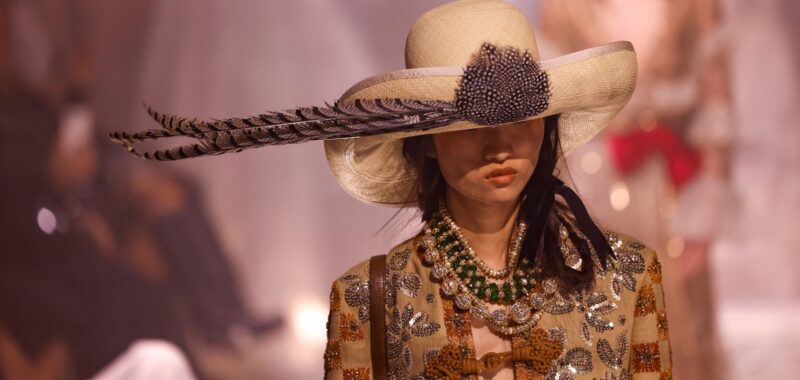PARIS — Alessandro Michele’s eagerly awaited ready-to-wear Paris Fashion Week debut at Valentino was unveiled in a setting that hinted at a transformation— a living room in flux. Stools, ladders, and lamps shrouded beneath white blankets evoked a house renovation, signaling not just change, but a conscious revival of past glories. The scene, poetic and subdued, perfectly set the stage for a “maximalist-lite” spectacle that was equally haunted by history and illuminated by Michele’s unique flair.
Meanwhile, under the soaring ceilings of the École des Beaux Arts, overlooking the Seine, Sean McGirr’s sophomore ready-to-wear show for Alexander McQueen arrived with a palpable sense of relief. The shift in setting — from a bleak industrial warehouse outside Paris to this iconic venue — reflected a fresh start for McGirr, whose uncertain debut had left critics shivering, both literally and figuratively. Now, with the benefit of more time to prepare, McGirr appeared more at ease, though hints of his sometimes overly simplistic approach still lingered.
Here are some highlights of spring-summer 2025 ready-to-wear shows:
The mood was set with haunting music and the steady beat of a drum, creating an ambiance charged with drama and anticipation. Michele, who made headlines earlier this year after being named the new creative director of Valentino, following his successful reign at Gucci, brought with him much of his recognizable style. Yet there was a distinctive evolution in his vision — less overtly ostentatious, but still unmistakably eclectic.
Feathers floated on hats, soft and playful. Lingerie peeked through delicate layers. Flowers, fortune tellers’ hats, sparkling embellishments — all coalesced into an eclectic wardrobe that carried a vintage feel. Michele, it seemed, was teasing apart the DNA of both houses he knows intimately: the exuberance of Gucci and the ethereal heritage of Valentino.
Some of the pieces felt familiar to longtime Valentino admirers: the feminine nipped-waist dress, the floppy floral gown with its tiered skirt, and the iconic Valentino red that made its dramatic entrance. Yet in Michele’s hands, these classics were playfully twisted — feathers replaced fur on a billowing stole, and the result was a softer, more modern take that eschewed excessive luxury.
Jared Leto was among the VIPs who sat in the front row, a testament to Michele’s continued draw among Hollywood’s elite. The designer, who had risen to international recognition by infusing Gucci with his beloved “Geek-Chic” aesthetic, seemed to bring a similar ethos to Valentino, though filtered through a more graceful, couture lens.
Throughout his tenure at Gucci, Michele was celebrated for prioritizing his personal vision over the often suffocating codes of heritage houses, and Sunday’s show echoed that defiant spirit.
The opening tailored suit, its lapels rolled as if to ward off an unexpected London downpour, seemed a pointed metaphor — perhaps a shield against the relentless skepticism that followed his first runway outing. This season, McGirr turned to a reference steeped in both his heritage and McQueen’s early days: the dark romance of the “Banshee” show. In doing so, he anchored his own identity more deeply in the label’s legacy, embracing a Gothic allure that was more commercially viable this time around.
It was a collection of contrasts. The precise tailoring echoed McQueen’s subversion of British suiting, twisting and clutching fabric in ways that seemed as though it had been caught in a sudden gust. However, this wasn’t always effective. One such example — a jagged, off-white tuxedo — felt more like a costume of restraint. This overly simplistic take on tailoring lacked the subtle layering and tension that distinguished Sarah Burton’s previous work for the house.
Where McGirr truly shone, however, was in his eveningwear — an area that has become increasingly vital in the era of celebrity-driven fashion. The shimmering embroideries and featherlight silks, frayed and distressed in lilac georgette, signaled his understanding of red carpet glamour. The brushed white chiffon minidress, paired with a gold beaded and sequined jacket, made a convincing case for the designer’s growing confidence. And when the silver chains traced the body’s lines, their intricate embroidery brought a level of audacity that was finally worthy of McQueen.
The night’s high point was a look of pure excess: an extreme gown embroidered with glistening silver chains that seemed to catch every glimmer of light in the venue. It was an ensemble that Daphne Guinness herself — who watched approvingly from the front row — might have worn in a heartbeat.
Despite his strides, McGirr’s sophomore effort still carried the weight of a designer learning the ropes of a storied brand.
Akris’ Sunday collection had the audience leaning in, not for any over-the-top spectacle, but for the luxurious subtleties that Albert Kriemler so masterfully crafts. The designer, true to form, took the trench coat idea — a staple of the wardrobe — and transformed it into something distinctly Akris. With utilitarian detailing threaded through every seam, this was an exercise in functional luxury, the kind that Kriemler has long perfected. His designs don’t shout; they whisper.
The collection opened with takes on trenches, each reimagined to fuse practicality with fashion-forward flair. Minimalism, too, reigned supreme, with looks that kept embellishments at bay to let the craftsmanship shine. A flat, clean-cut fabric top paired with culottes nodded to the timeless Akris aesthetic — unfussy, luxurious, and quietly powerful. This was minimalism of the highest quality, a testament to Kriemler’s commitment to making clothes that defy the viral trend, focusing instead on timeless appeal.

